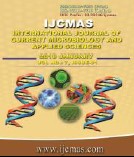


 National Academy of Agricultural Sciences (NAAS)
National Academy of Agricultural Sciences (NAAS)

|
PRINT ISSN : 2319-7692
Online ISSN : 2319-7706 Issues : 12 per year Publisher : Excellent Publishers Email : editorijcmas@gmail.com / submit@ijcmas.com Editor-in-chief: Dr.M.Prakash Index Copernicus ICV 2018: 95.39 NAAS RATING 2020: 5.38 |
The cultivated species of Peanut (Arachis hypogea) and Soybean (Glycine max) belong to family Leguminosae. Leguminous crops have been cultivated since ancient times. Globally, Peanut and Soybean are the two most important oil-yielding leguminous crops. Yields of both Peanut and Soybean are lower in Asia than in developed countries. These low yields are due to a number of biotic and abiotic constraints. Hence, in order to increase crop yield per unit area, largely chemical fertilizers are used. The result of these activities in recent years has been the crisis of environmental pollution, especially water and soil pollution that threatens human society. Due to negative environmental impact of chemical fertilizer and their increasing costs, the use of soil microorganisms for sustainable agriculture has increased in various parts of the world. Plant growth promoting rhizobacteria (PGPR) are a group of bacteria that actively colonize plant roots and increase plant growth and yield. The PGPR used in this experiment are; Phosphorous solubilizing bacteria (PSB), Trichoderma viride and Pseudomonas fluorescence. The result of the study suggests that Phosphorus solubilizing bacteria (PSB) followed by Pseudomonas fluorescence retained maximum growth parameters in Peanut seeds. Whereas, in case of Soybean maximum growth parameters were observed in Phosphorus solubilizing bacteria (PSB) followed by Trichoderma viride treated seeds. This differential behavior in response of bio-fertilizers can be attributed to the different mode of phosphorus requirement and nitrogen fixation mechanism in respective crops.
 |
 |
 |
 |
 |